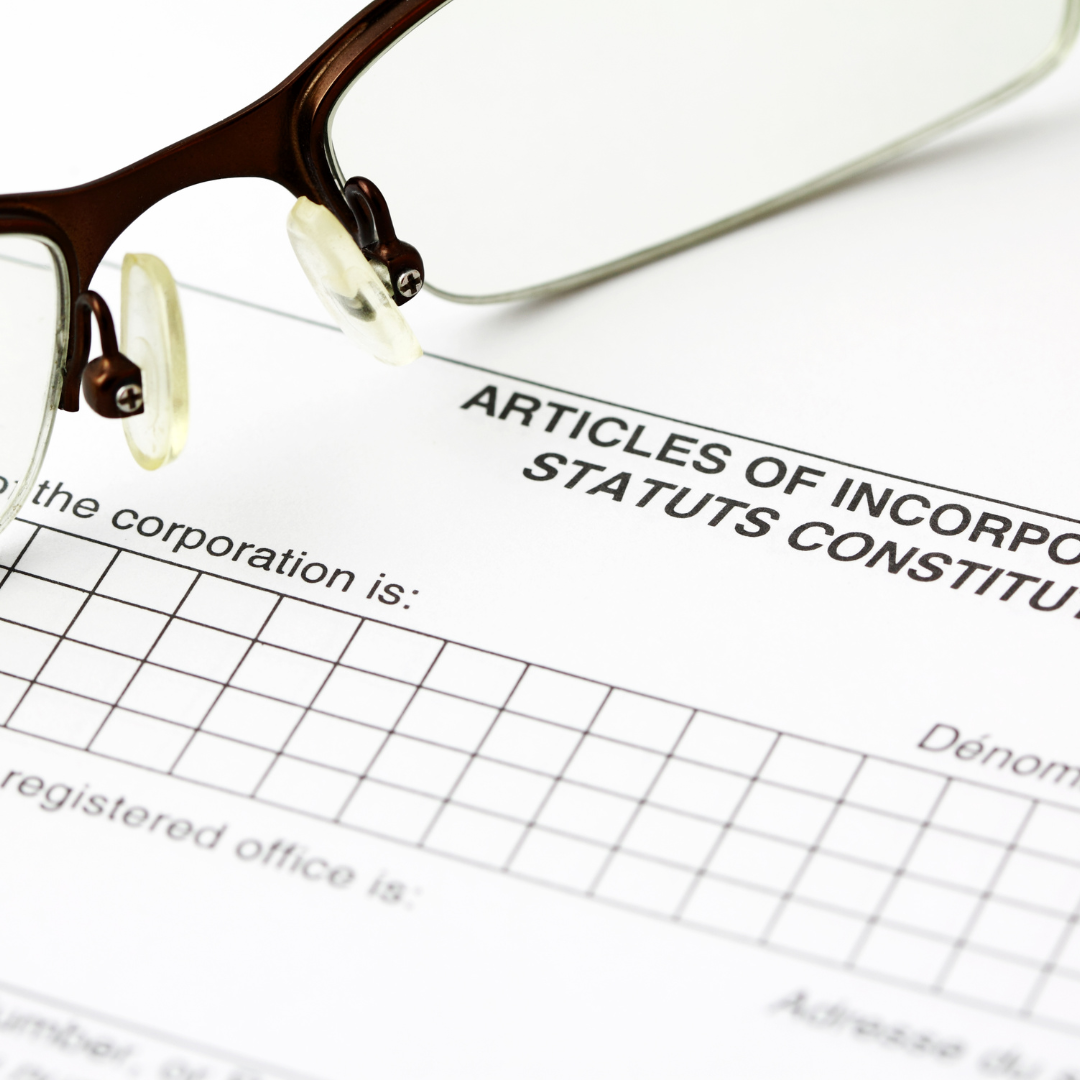Amendment of Articles of Association
Amending Company Rules-Amendment of articles of association is a change or modification to the document that defines the rules and regulations of a company. The articles of association are usually drafted when a company is formed, and they cover various aspects such as the name, purpose, capital, shares, directors, meetings, and company dividends.
The articles of association are a legal contract between the company and its shareholders, and they also affect the rights and obligations of the directors and other officers. Therefore, it is important to keep them updated and relevant to the current situation and needs of the company.
There are many reasons why a company may want to amend its articles of association, such as: Amending Company Rules
– To comply with new laws or regulations that affect the company’s operations or governance
– To reflect changes in the company’s structure, strategy, or objectives
– To clarify or correct any errors or ambiguities in the original document
– To accommodate the preferences or requests of the shareholders or other stakeholders
– To improve the efficiency or effectiveness of the company’s management or decision-making
However, amending the articles of association is not a simple or straightforward process. It requires careful planning, consultation, and approval from various parties involved. Depending on the type and extent of the amendment, different procedures and formalities may apply.
Generally speaking, there are two ways to amend the articles of association: by special resolution or by written resolution.
A special resolution is a vote by the shareholders at a general meeting, where at least 75% of the votes cast must be in favor of the amendment. A special resolution can be used to amend any part of the articles of association, except for those that are prescribed by law or by the company’s memorandum of association (the document that establishes the company’s existence and identity). A special resolution must be filed with the relevant authority (such as Companies House in the UK) within 15 days after it is passed.
A written resolution is a written agreement by the shareholders without holding a general meeting. A written resolution can also be used to amend any part of the articles of association, except for those that are prescribed by law or by the memorandum of association. However, a written resolution requires a higher level of consent than a special resolution: at least 75% of the total voting rights of all eligible shareholders must agree to the amendment. A written resolution must be circulated to all eligible shareholders and filed with the relevant authority within 15 days after it is passed.
Before proposing an amendment of articles of association, it is advisable to consult with a legal expert who can advise on the best way to proceed and draft the appropriate wording for the amendment. It is also important to communicate with the shareholders and other stakeholders who may be affected by the amendment and seek their feedback and support. Finally, it is essential to keep a record of all the steps taken and documents produced during the process, as they may be required for future reference or verification.
Importance of Articles of Association – Amending Company Rules
The articles of association serve as the regulatory framework governing a company’s internal affairs, including its management structure, hierarchy, and operational guidelines. These articles essentially define how the company operates and its contractual obligations with its members.
Conditions for Amendment – Amending Company Rules
Several conditions must be met when altering the articles of association to ensure legality, fairness, and alignment with the company’s objectives and applicable laws:
- Consistency with company objectives and memorandum terms
- Compliance with relevant laws, including the Companies Act, 2013
- Benefit to the company as a whole
- Protection of minority shareholder rights
- Compliance with ongoing litigation proceedings, if applicable
- Non-retrospective changes
- Maintenance of paid-up share value and liabilities
- Preservation of membership, voting rights, and meeting attendance privileges
- Exclusion of non-members from benefiting from amendments
Procedure for Amendment – Amending Company Rules
The process of amending the articles of association involves several steps, including:
- Board Meeting: A board meeting is convened to discuss and approve the purpose and specifics of the proposed amendments.
- Shareholder Notification: Shareholders are notified of the proposed amendments and the meeting details at least twenty-one days in advance.
- Creditor Disclosure: A list of creditors, debenture holders, and lenders is compiled and disclosed to shareholders, ensuring transparency regarding the company’s financial obligations.
- Affidavit Submission: An affidavit signed by the company’s secretary and directors, affirming that the amendments won’t affect lender repayments, is presented to shareholders.
- Resolution: Shareholders pass a special resolution approving the proposed amendments during the meeting.
- Lender Notification: If a lender is adversely affected by the amendments, a copy of the minutes and altered articles is sent to them within fifteen days.
Articles of Association Overview
A company can change its articles of association by calling a meeting of the shareholders and passing a resolution. A company can amend the articles for any reason that involves improvement of the business prospects. A company may wish to amend the articles to diversify its business or enhance the scope of its existing business.
The articles of association are the regulations which govern a company’s internal affairs. The articles govern the company’s management structure and hierarchy. The articles also provide a framework for implementing the objectives of the company. The objectives of a company can be found in the memorandum of association. A company’s business should be conducted according to the articles. The articles establish a contract between the company and the members. The contract governs the rights and obligations of the members.
All companies are permitted to amend the articles by fulfilling the applicable legal requirements. The Ministry of Corporate Affairs governs the procedure for amendment of the articles.
Conditions
The following conditions should be followed by a company which is altering the articles of association:
- The alteration should not introduce any terms which are inconsistent with the objectives of the company.
- The alteration should not contravene or contradict the terms of the memorandum.
- The alteration should be consistent with the Companies Act, 2013 and other applicable laws.
- The alteration should be for the benefit of the company as a whole.
- The alteration should not introduce any terms which are disadvantageous to a minority of the shareholders.
- A company may be under litigation relating to the terms of the articles. In such cases, the alteration should be made under the guidance of the court.
- The alteration should not be made retrospectively. The effective date appointed for the modification should not be before the date of passing a special resolution.
- The alteration should not change the paid-up value of the shares.
- The alteration should not change the company’s liabilities towards lenders.
- The alteration should not remove any person from membership in the company.
- The alteration should not cancel the voting rights available to the shareholders.
- The alteration should not prevent shareholders from attending meetings.
- The alteration should not introduce benefits to persons who are not members of the company.
- The alteration should not be used as a method to enter into an agreement with persons who are not members of the company.
Procedure to Amend Articles of Association
- A board meeting should be held. The notice inviting the directors to attend the meeting should state the agendas. The notice should be given to the directors at least seven days before the meeting. The agendas should be the following:
- To discuss and approve the purpose for which the articles are amended.
- To recommend the shareholders to approve the purpose for which the articles are amended.
- To discuss and approve the amendments that are introduced in the articles
- To recommend the shareholders to approve the amendments that are introduced in the articles
- To finalise the date, time and place for the shareholders’ meeting
- To discuss and approve the ‘explanatory note’ which explains the purpose of the shareholders’ meeting
- To authorise the company’s secretary to forward the explanatory note and the notice for the meeting to the shareholders
- The notice for the meeting and the explanatory note should be sent to every shareholder twenty-one days before the meeting.
- A list of creditors, debenture holders and other lenders to the company should be compiled. The list should mention the name of the lender and the amount due. The date on which the credit facility was availed should also be mentioned. If a particular debt is in dispute, the fact should be disclosed. The list should be laid before the shareholders. The minutes of the meeting should record the fact that the shareholders perused the list. A shareholder may make any remarks regarding the list. The remarks should be recorded in the minutes.
- An affidavit should be drafted stating that the alteration does affect the amount repayable towards any of the lenders. The affidavit should be signed by the company’s secretary and at least two directors of the company. It should also be signed by the managing director. The affidavit should be laid before the shareholders. The minutes of the meeting should record the fact that the shareholders perused the affidavit. A shareholder may make any observations regarding the affidavit. The observations should be recorded in the minutes.
- The format which a company should follow for the articles depends on the type of company. Unlimited companies and guarantee companies having share capital need not follow any particular format. A company incorporated with share capital should draft the articles as per Table F. A guarantee company should draft the articles as per Table H. Table F and Table H form part of Schedule I of the Companies Act, 2013.
- The shareholders attending the meeting should pass a special resolution approving the alteration of the articles.
- A shareholder attending the meeting may observe that a particular lender is adversely affected by the alteration. In such cases, a copy of the minutes together with the altered articles should be forwarded to the concerned lender within fifteen days.
Filing Requirements
- Within thirty days of the meeting, the company should file form MGT-14 with the Ministry of Corporate Affairs (MCA). The purpose of filing form MGT-14 is to record that the company has passed a special resolution for altering the articles. Before filing the form, the applicant should register with the MCA.
- The format of form MGT-14 is given below for reference




